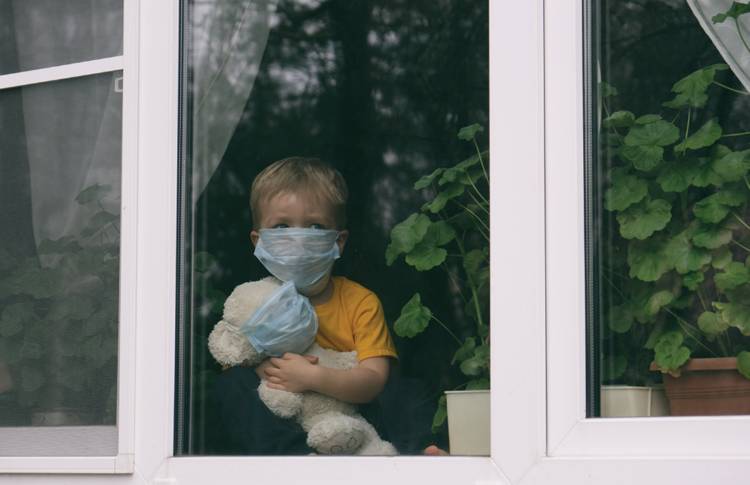Jenifer Chacon, ChildNet Youth and Family Services, Inc., Long Beach, California
Kathy L. Reschke, ZERO TO THREE, Washington, DC

Abstract
In the spring of 2020, the emerging COVID-19 pandemic prompted states across the country to mandate that most early childhood education programs close, leaving families with young children scrambling to adapt to full-time caregiving and leaving educators uncertain of their economic and professional future. For many communities, this hardship was only the latest to impact babies and toddlers and those who care for them. In this article, the perspective of an infant-early childhood mental health consultant working with struggling educators, families, and young children adds a sharp focus to the information gathered nationally about the well-being of babies and families and about the early educators who strive to support them despite their own challenges in these turbulent times.
An infant’s mental health develops from day one in the context of family, community, and culture (ZERO TO THREE, 2001). It’s the “nature dancing with nurture” signaling the ongoing relationship between the biological and the ecological (Shonkoff et al., 2012). The interaction between nature and nurture in infant mental health emphasizes the importance of how an infant “experiences” the world (Zeanah & Zeanah, 2019).
The world in 2020 changed for everyone, including babies. On January 30, 2020, COVID-19 was declared an “international concern” by the World Health Organization (2020). From that day forward, communities, states, and entire countries mobilized to address the pandemic by bringing about the use of masks, social distancing regulations, widespread closures, and quarantine ordinances. Each change caused an impact at the individual, family, community, and societal levels. And, for the first time in recent history, the impacts were felt by everyone; the young and old; the rich and poor; the teacher and child; the client and provider.
In 2019, more than 12 million children younger than 5 years old were in some form of early learning setting (Child Care Aware of America, 2019). Most, if not all, of those children and their families have been significantly affected, in one way or another, over the past year by COVID-19. Right alongside them, the professionals trained to support them have been affected by the pandemic as well. The systems in place to assist them—many of which were already in a fragile or ineffective state—have also been impacted. As stressful as the pandemic has been at every level of care surrounding infants and toddlers, countless children have also experienced the direct and indirect impacts of additional traumas in their communities, making the goal of ensuring their well-being orders of magnitude more difficult. To illustrate, we asked a colleague working in infant and early childhood mental health (IECMH) to share her recent experiences.
Deborah, a licensed clinical social worker in Sonoma County, California, has been working with young children and their families in an area that has been suffering through 4 years of devastating wildfires. In addition to risks to their health and safety, the fires have resulted in job losses and insufficient, unaffordable housing. Latinx families in the area have the additional stresses of U.S. Immigration and Customs Enforcement raids and deportations and prejudice, and the entire community feels the impact of social unrest. Many of the families in the county live in densely populated housing, contributing to higher rates of COVID infection than surrounding counties. “While resilience, self-care, and mindfulness are the slogan of the healing community, we have reached a tipping point as professionals for how we can continue to care for ourselves and our population,” Deborah shared.
For young children and families, and the early childhood education (ECE) programs serving them, in other parts of the country, the constellation of hardships and traumas will be different. And yet, regardless of the specific combination of stressors in their lives, the overarching reality for so many caregivers is that ensuring the emotional well-being of the young children in their care has never been more challenging or more important
Supporting IECMH in ECE Settings
In all circumstances, young children’s well-being is at the center of the work of early childhood educators and the IECMH professionals who support them. Nurturing infants’ and toddlers’ mental health means fostering their “capacity to experience, regulate, and express emotions, form close and secure relationships, and explore the environment and learn” (ZERO TO THREE, 2001). Additional key ingredients in promoting children’s healthy social and emotional development include: safety, low stress levels, and access to regular prenatal care during the prenatal period; the opportunity and the ability to love and be loved; a co-regulating “other” and support in developing self-regulation skills; and a nurturing caregiving environment (Brandt, 2014). Just as social and emotional development can be supported by these key ingredients in ECE settings, it can also be threatened by negative early experiences in the environment (ZERO TO THREE, 2001), due in large part to the impact of experience on the developing brain
The early experiences in a young child’s life influence the developing brain’s architecture and functions. Early experiences help build the connections that are necessary to develop life-long skills (Shonkoff et al., 2012). The connections are formed at a remarkably fast pace—one million new neural connections every second during the first few years of life—enabling the capacity to adapt to a variety of environments and circumstances (Center on the Developing Child, 2017). Long-term adverse childhood experiences (ACEs) in a young child’s environment can negatively affect the developing brain, potentially leading to life-long difficulties in overall development. ACEs activate the body’s response to stress. The constant and prolonged activation of the stress response system in a young child’s body continuously floods the brain, altering the way the brain develops and possibly leading to lifelong problems in learning, behavior, and both physical and mental health (National Scientific Council on the Developing Child, 2005/2014).
The stress resulting from the extended, often compounded, traumas that families have been experiencing jeopardizes the well-being of young children. For infants and toddlers, the negative impacts of these traumas are most often indirect, the ripple effect from the caregiver–child relationship when caregivers are experiencing high levels of stress themselves. In addition, the emotional impact on parents or caregivers of social isolation, loss of employment, school closures, and loss of loved ones may exacerbate the impact of ACEs already present in many young children’s lives (Sanders, 2020). The stress experienced by very young children may also escalate or lead to new behaviors like social anxiety, fear of being separated from a caregiver, moodiness, irritability, and possible regression. The extended, severe stress on families in communities experiencing multiple catastrophic circumstances is proving to be devastating for the most vulnerable, particularly when compounded with added personal challenges. Deborah shared the story of one young child with whom she works.
Joey was born in Santa Rosa in 2015 where he lived with his dad and stay-at-home mom who was his full-time caregiver. They had a strongly attached relationship and mom was well attuned to her child, who she continued to breastfeed through his second year. At 18 months, mom described Joey as a happy and easy baby who was growing into a curious, animated, and expressive toddler. Joey was meeting all of his developmental milestones on the early side. When Joey was 18 months old, his dad suffered a serious injury at work and was unable to work at his construction job for almost a year. Mom needed to work to support the family so dad became Joey’s caregiver from his bed or the couch. This was the beginning of multiple stressors to impact the family. Joey began preschool in September 2017, and was just getting settled into the school routine and adjusting to being in a group setting when the first of 4 years of wildfires swept through Sonoma County. His family was evacuated for 3 weeks and although his family’s home didn’t burn down, the family moved abruptly shortly after returning home. The school, located within blocks of neighborhoods with charred homes and businesses, reopened in November. While all the young children in Joey’s preschool class, as well as the teachers, were impacted by the fires, Joey’s return to preschool was particularly difficult, marked by hard times with transitions and aggression with other children and teachers. The teachers and school administration just didn’t have the capacity to support Joey’s needs. On the day that the school and family decided his continued attendance there was not a good fit, Joey’s dad was diagnosed with a blood cancer that required his admission to a hospital out of the county for 3 weeks and sent him home with a long-term debilitating prognosis and compromised immune system. These multiple traumas all occurred before Joey’s third birthday. For the next 9 months, Joey’s family would be in turmoil with health and economic stressors, another season of smoke and evacuations, and another failed attempt at ECE.
Joey and his family ended up in my office shortly before his fourth birthday. With considerable dyadic therapy involving the child and both parents, Joey was able to find growing success in a transitional kindergarten program only to switch abruptly to distance learning with the onset of the COVID-19 pandemic, another fire evacuation with flames visible from his house, and continued distance learning challenges and teachers who don’t have the capacity to support the learning needs of all of the diverse children in their classes.
Joey’s response system is in a permanent state of high alert. His sleep is interrupted most nights and he rarely makes it through the night in his own bed. He can be reactive, throw tantrums, and push limits. He had a hard time getting along with children his own age or younger, although he plays well with his older cousins. He is rarely able to participate in a group such as music or gymnastics or now transitional kindergarten without being disruptive and needing to be removed for part of the time. Joey’s parents are trying to cope with multiple stressors and some days are better than others.
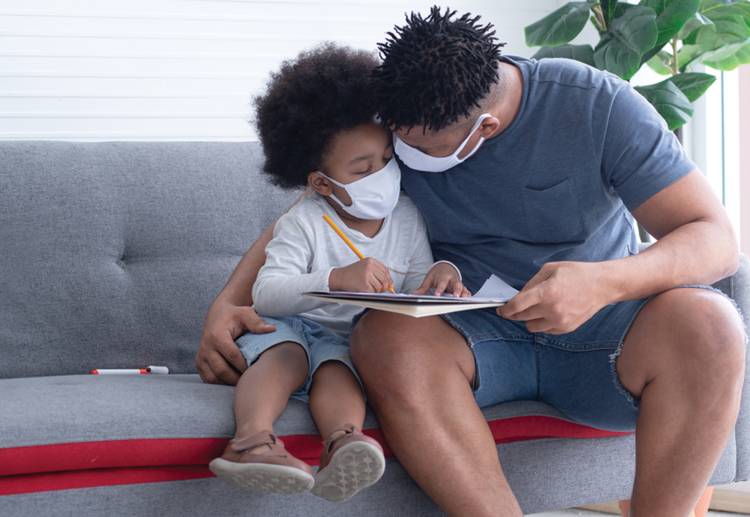
High on the list of protective factors is the presence of supportive relationships that act as buffers to stress. Photo: chomplearn/shutterstock
Even in the face of multiple ACES, young children have the ability to bounce back from negative experiences with the appropriate protective factors in place to support resilience (Center on the Developing Child, 2015). An “adaptive response to hardship” results when the positive experiences in a child’s life outweigh the negative experiences (Center on the Developing Child, 2015). High on the list of protective factors is the presence of supportive relationships that act as buffers to stress because they provide the responsive care, scaffolding, and protection necessary for all young children to thrive (Center on the Developing Child, 2015). As ECE programs have reopened over the past several months, early childhood educators are welcoming back young children who have been living through unparalleled changes with varying degrees of impact on their mental health and emotional well-being. For an unknown number of those children, like Joey, this time has involved exposure to ACEs, or more accurately a collection of them, that will require trauma-informed care (see Bartlett, this issue, p. 24) from early childhood educators and IECMH providers.
Early Childhood Educators Provide a Protective Buffer
All capacities related to infant and early childhood mental health are “best accomplished within a caregiving environment” (ZERO TO THREE, 2001). A key part of the caregiving environment is the presence of supportive caregivers, whether parents and family or professional care providers and educators. Caregivers play a key role in protecting children from life-threatening circumstances such as the pandemic. Caregivers provide safety, guidance, reassurance, support, and serve as a model for the appropriate response to difficult situations. Caregivers who are sensitive to the needs of their children by being tuned in to and responsive to the cues of children, support the development of a secure attachment and set the foundation for health across the lifespan (National Scientific Council on the Developing Child, 2004).
The long-term stress impact of the COVID-19 pandemic and additional stressors may affect the caregivers’ and educators’ ability to be present and serve as the protective factor children need to buffer the stress. Early childhood educators have been forced to balance home, work, family, school, and so much more in ways they have never faced before. At the same time, concerns of health and safety due to the high rate of contagion have added another layer to their struggle. The overwhelming stress caregivers and educators have experienced during the pandemic can lead to feelings of fear, worry, frustration, and anger. Adults with pre-existing physical and mental health conditions might be even more susceptible to the negative effects of the stressors.
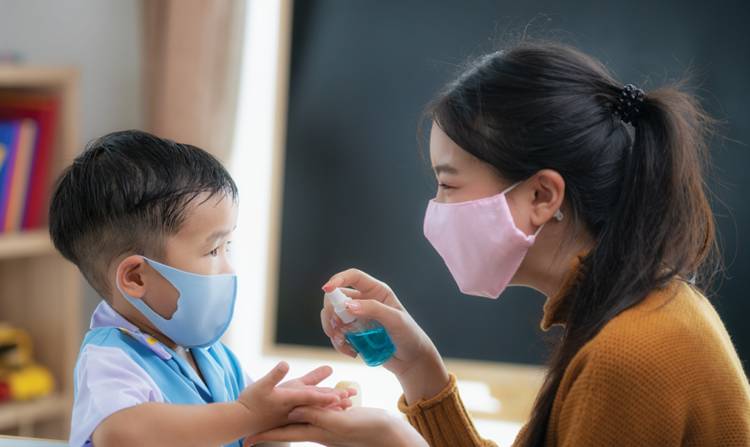
Caregivers provide safety, guidance, reassurance, support, and serve as a model for the appropriate response to difficult situations. Photo: anek.soowannaphoom/shutterstock
Early childhood professionals have a tremendous impact on the lives of young children and their families. Young children have the capacity to form and can benefit from secure relationships with multiple significant adults and, for the more than 12 million young children in care, the relationship between a young child and their early childhood educator is an important one (National Scientific Council on the Developing Child, 2004). COVID-19 disrupted that relationship for most young children in the spring of 2020 when programs closed either because of state mandates or because too many families withdrew their children to make it financially feasible to stay open. Primarily Black and Hispanic communities have been hit disproportionately hard, both directly from infections and death and indirectly from economic impacts. It is not surprising that ECE programs serving families in these communities have suffered similarly (Malik et al., 2020). As the pandemic wore on, programs were allowed to open but with strict limitations, including for some the restriction of offering programming only virtually. Although virtual education has been a viable option for older children, it has proved even more stressful for teachers of very young children (Nagasawa & Tarrant, 2020b).
Of course, just like the families they serve, ECE professionals have not been dealing only with the challenges of the pandemic. They, too, are directly and significantly affected by these same challenges to their health and well-being (Nagasawa & Tarrant, 2020a 2020b). They, too, are members of communities facing direct threats to physical health and safety from COVID-19, natural disasters, and racism and racial injustice, along with the inevitable indirect impacts of these threats on economic well-being and mental and relational health. Deborah wrote about the effect of the multiple stressors on the early childhood educators in Sonoma County:
The teachers are trying their best to cope. Their emotions on some days are raw. Teachers have been disbursed multiple times over the past years as fires threaten various parts of the community or communities have power shutoffs for over a week, all in the midst of COVID-19. What would have been a small challenge in the past can now be experienced as overwhelming by a teacher. Directors also walk a fine line of figuring out how to support the mental health of the teachers and still hold staff accountable for the work with the children and parents and for documenting the learning in the classroom.
Beyond the strain that countless stressors can have on the early childhood educators, and thus on the caregiving environment, educators can continue supporting young children by practicing mindfulness and self-compassion, providing responsive interactions, and maintaining familiar, consistent routines. Mindfulness is the awareness and acceptance of thoughts, feelings, bodily sensations, and the surrounding environment without trying to determine if they are good or bad and “avoiding self-blame when goals are not achieved” through self-compassion (Duncan et al., 2009; Kinsner et al., 2018). As educators become more aware of their own emotions, they can become more attuned to the cues of the young children in their care, which are the basis of responsive interactions (Kinsner et al., 2018; Seibel et al., 2009). The back-and-forth interplay between a young child and an educator facilitates neural connections in the areas of language, cognition, and social and emotional development, and it strengthens attachment. The predictability of a routine also supports brain development and creates a sense of security and safety in the life of a young child as they know what, how, and when things will happen (Seibel et al., 2009).
Disrupted Systems of Care
There is no local, state, or national system upon which families with young children depend that has not been tested, and in some cases upended, by the pandemic. Employment, public transportation, health care and emergency services, education, housing, social services, and access to basic goods such as food have been directly and indirectly challenged. And all of these systems are interconnected. So just as a disturbance at one point on a spider web disturbs the whole web, so have the negative impacts of COVID-19 on each system then created further negative impacts on all of the other systems. For the families in Sonoma County, repeated wildfires have placed their own burdens on all of these same systems, compounding the stress on the network of services and necessities that families need to survive. Other communities have suffered other additional layers of disruption to their systems: hurricanes, floods, and blizzards; racially motivated violence and injustice; and political divisiveness and rancor.
Studies of other extended or multilayer disasters (Boasso et al., 2015) have shown that flaws in existing systems of support become more obvious and consequential under the burden of extensive need. This has certainly proven true in the case of the ECE system in the US. The COVID-19 pandemic has highlighted and exacerbated chronic inadequacies in the ECE system (Malik et al., 2020), including over-reliance on family tuition and insufficient public funding (Child Care Aware of America, 2019). Decreased and unpredictable enrollment because of mandated shutdowns and changes in parents’ employment combined with increased costs to programs of implementing health requirements, such as lower ratios and sanitation supplies, proved too burdensome for many programs that already operated on tenuous budgets (Child Care Aware of America, 2020; National Association for the Education of Young Children, 2020; Workman & Jessen-Howard, 2020). As of November 2020, 1 out of 4 ECE programs in the US were still closed approximately 6 months after restrictions were eased, and only 50% of those that are opened were operating at full capacity (Leonhardt, 2020). These limitations have left families who need ECE with even fewer options than before. In addition, the virus has had a very real and direct impact on the health of ECE staff. As programs have been allowed by states to re-open, staff have faced a dilemma shared by many low-income workers: the lack of health insurance. The risk of contracting the disease is magnified by the fact that many have underlying health conditions or risk factors (Lessard et al., 2020), and yet 85% of early childhood education professionals do not have employer-provided health insurance (Gould, 2015).
All of these adverse circumstances negatively impact the mental health of many ECE professionals. In a large survey of early childhood educators in New York in mid-2020, 91% of respondents reported that their emotional well-being had been affected by the pandemic, with more than one third reporting that the impact had been great (Nagasawa & Tarrant, 2020b). There is no question that educators who are struggling with their own emotional well-being will find the challenging work of caring for infants and toddlers even more so. All children will have experienced changes and inconsistencies that are distressing and will need educators to prioritize their emotional well-being and mental health (Jones-Hudson, 2020). Consider, however, the additional difficulties educators face when they find that some of the children returning to their care, such as Joey, have significantly greater mental health needs due to ongoing, complex stressors at home. Young children who have experienced trauma benefit most when ECE programs take a trauma-informed care approach (Bartlett et al., 2017). Providing the level of sensitive, nurturing care to young children whose behaviors reflect the trauma they have experienced adds yet another layer of stress on educators, no matter how much they may want to be able to do so.
Strained Systems of Support
Extended, multilayer disasters and traumas also strain leadership across the systems of support. Leadership is responsible for communication, maintaining the public trust, and conveying a sense of unity and commitment. When these messages and actions from leaders of sectors within the system are conflicting, confusing, or missing entirely, further strain is put on those mid- and ground-level providers who work directly with families, which in turn places further stress on families and inevitably on children.
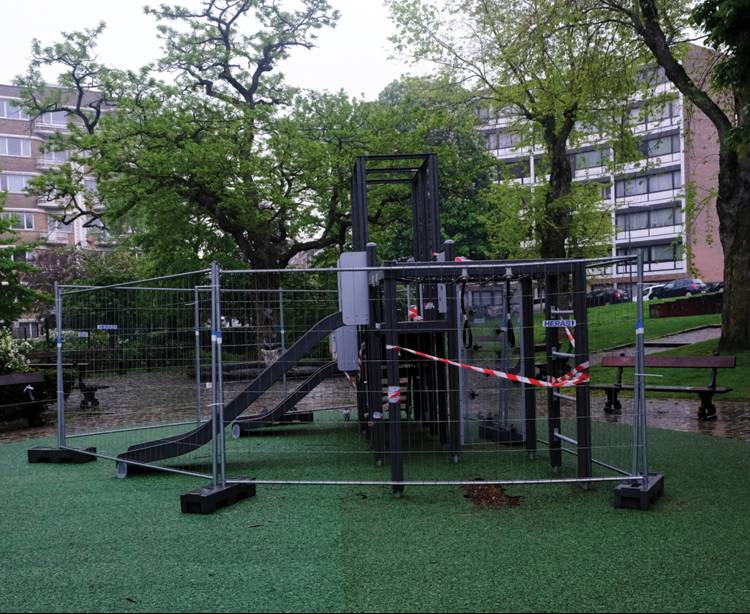
Employment, public transportation, health care and emergency services, education, housing, social services, and access to basic goods such as food have been directly and indirectly challenged. Photo: Alexandros Michailidis/shutterstock
As dire and overwhelming as these circumstances have been, hope can be found in places where individuals, organizations, and communities determine to forge creative, sometimes unlikely, alliances, pool resources, and innovate to meet needs (Laor et al., 2005). Small collectives of stakeholders can be much more flexible and quicker to adapt to changing circumstances and needs than large established systems of support (O’Connor et al., 2020). Deborah shared about the collaborative response at an ECE setting and the positive impact of IECMH consultation.
A local school in Sonoma County responded to the needs of the community with a three-person leadership team. The co-directors and the lead teacher have consistently been present at the site since the school opened, even with the impending risk of COVID-19 exposure and the need to quarantine. They have also faced the trauma of working remotely during fire evacuations and incidents of overt racism. A blessing in all of this is the support that an IECMH consultation project has provided. Where the IECMH consultants used to be the go-to team for supporting schools when there was a need for assessment and referrals, and for support of children who needed additional support in the classroom, they were able to pivot and instead support teachers and school community systems with professional development and with capacity and resilience building.
Building Resilience When Trauma Is Pervasive, Prolonged, and Amplified
Variations of the tumultuous and traumatic events described by Deborah have played out in countless other families, programs, and communities in recent years. Although periods of upheaval and trauma have certainly occurred many other times in the past, recent traumatic events have had a uniquely broad and deep impact on mental health because of the amplifying nature of news and social media (Wallis, 2020). Layers of traumatic events, perpetually broadcast on media, effectively create a shared anxiety and stress at a societal level. The COVID-19 pandemic quite literally created globally shared traumatic stress that has pervaded virtually all aspects of daily life, layered atop any other localized or individual traumas.
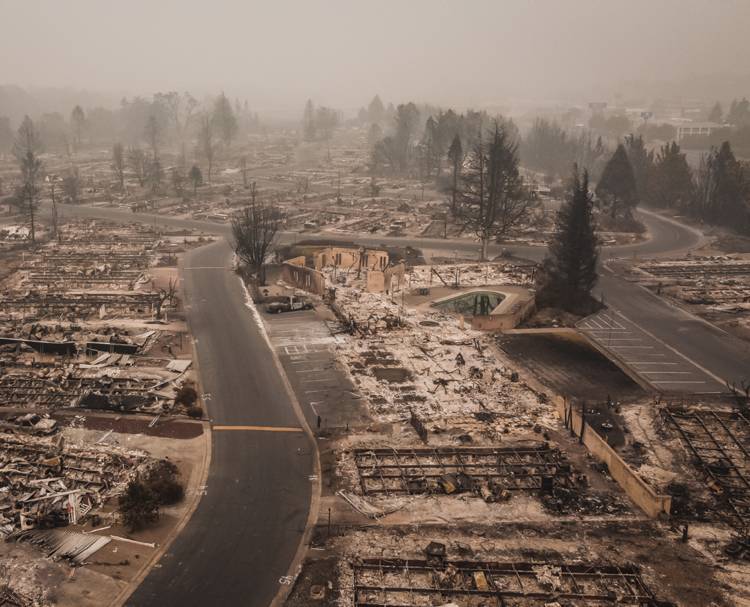
For the families in Sonoma County, repeated wildfires have compounded the stress on the network of services and necessities that families need to survive. Photo: arboursabroad/shutterstock
When the volume level of traumatic stress is high, and stays high over time, it reveals and eventually influences the values, norms, and policies of society. For example, the extensive shared trauma experienced over the recent past has raised awareness of the extent of racial and social inequities, divisions, and destructive attitudes. These are macrosystem influences that shape the experiences of individual babies and toddlers like Joey. Keeping the mental health and emotional well-being of infants and toddlers as a top priority also means being aware of and seeking ways to intentionally reshape these overarching influences.
In addition to the self-care mentioned earlier, taking action to counteract negative influences not only has a positive effect on shaping the future but also benefits one’s own mental health. Although the pandemic has severely limited the professional and community relationships that many early childhood professionals relied on to take action on behalf of babies, families, and early childhood educators, many professionals are taking advantage of technology to connect with one another for the purpose of taking action and making changes for the better. For example, in late January 2021, the governor of Ohio announced that, contrary to Centers for Disease Control and Prevention guidelines, educators caring for children younger than kindergarten-age would not be included with K-12 educators in the next phase of COVID-19 vaccine distribution due to insufficient supply (Smith, 2021). A small group of ECE professionals quickly came up with the idea to use an online petition platform to gather signatures to ask the governor to include these essential education professionals. News of this petition was quickly shared via social media. Within 1 week, not only had 21,000 signatures been collected, but the effort had gained the attention of news media across the state. Local ECE advocates were called on to give interviews and explain the role that early childhood educators have played throughout the epidemic and at what costs. At the time of writing, the effort has reached the ears of the governor but no change in policy has been made. Nevertheless, the very action of gathering and amplifying the voices of early childhood educators using online tools and channels has raised awareness and generated a much-needed feeling of empowerment for many. This petition is just one example of the many innovative ways that early childhood professionals are finding to use the power of their connections to keep the well-being of babies, and the professionals who care for and teach them, as a priority in policy and practice.
Only time will tell how this period of remarkable challenge will change the world, systems, communities and programs, families, and, most notably, the young children who have lived the first months and years of their lives enveloped in its many ripple effects. As stories emerge of resilience in families and communities, survival of ECE programs and services, and rebuilding and improving on old systems of care, the power and magic of relationships will undoubtedly surface as essential fuel in all of them.
Author’s Note
ZERO TO THREE Members: Do you have a story to share of resilience, collaboration, or innovation in support of young children’s emotional well-being during these extraordinarily challenging times? We encourage you to share the efforts in which you have been involved or have witnessed in your community. Visit ZERO TO THREE’s Member Connect and add your story to the discussion labeled, “Safeguarding the Well-Being of Babies: Your Stories.”
Author Bios
Jenifer Chacon, MSW, is an associate clinical social worker and an infant and early childhood mental health advocate. Ms. Chacon is a University of California-Davis Napa Infant-Parent Mental Health Fellow and has worked as a policy analyst, senior writer/training specialist, and content specialist at ZERO TO THREE. Ms. Chacon is the Policy Committee co-chair for the California Association of Infant Mental Health and is in direct practice as a clinician at a mental health agency in Long Beach, California.
Kathy L. Reschke, PhD, is a senior content specialist for ZERO TO THREE. In this role, Dr. Reschke contributes to the design and development of ZERO TO THREE’s multidisciplinary, competency-based professional development products and services for individuals and organizations. She works with the HealthySteps National Office in supporting the professional development of HealthySteps Specialists and contributes to the design of virtual training for early childhood professionals for the Professional Development and Workforce Innovations department. Dr. Reschke also serves as editorial assistant for the ZERO TO THREE Journal. In this capacity, she edits Crib Notes, the monthly newsletter to members, and provides assistance to the editor in development of each issue of the ZERO TO THREE Journal.
Suggested Citation
Chacon, J., & Reschke, K. L. (2021). Safeguarding the well-being of babies in the midst of unprecedented turmoil. ZERO TO THREE Journal, 41(3), 51–58.
References
References Bartlett, J. D. (2021). Trauma-informed practices in early childhood education. ZERO TO THREE Journal, 41(3), 24–34.
Bartlett, J. D., Smith, S., & Bringewatt, E. (2017). Helping young children who have experienced trauma: Policies and strategies for early care and education. Child Trends.
Boasso, A., Overstreeet, S., & Ruscher, J. B. (2015). Community disasters and shared trauma: Implications of listening to co-survivor narratives. Journal of Loss and Trauma, 20, 397–409.
Brandt, K. (2014). Core concepts in infant-family and early childhood mental health. In K. Brandt, B. D. Perry, S. Seligman, & E. Tronick (Eds.), Infant and early childhood mental health: Core concepts and clinical practice (pp. 1–20). American Psychiatric Publishing.
Center on the Developing Child. (2015). The science of resilience (InBrief).
Center on the Developing Child. (2017). Brain architecture.
Child Care Aware of America. (2019). The US and the high price of child care: An examination of a broken system.
Child Care Aware of America. (2020). Picking up the pieces: Building a better child care system post COVID-19.
Duncan, L. G., Coatsworth, J. D., & Greenberg, M. T. (2009). A model of mindful parenting: Implications for parent-child relationships and prevention research.
Gould, E. (2015). Child care workers are not paid enough to make ends meet (Issue Brief #405). Economic Policy Institute.
Jones-Hudson, C. (2020). Using psychological first aid to support children during the pandemic. Exchange, 5, 22–23.
Kinsner, K., Gehl, M., & Parlakian, R. (2018). How can mindfulness support parenting and caregiving? A literature review.
Laor, N., Wolmer, L., Friedman, Z., Spirman, S., & Knobler, H. Y. (2005). Disaster intervention: An integrative systemic perspective for health and social service professionals. In M. J. Friedman and A. Mikus-Kos (Eds.), Promoting the psychosocial well being of children following war and terrorism, (pp. 33–43). IOS Press.
Leonhardt, M. (2020). Over 1 in 4 child-care providers nationwide still remain closed. CNBC.
Lessard, L. M., Wilkins, K., Rose-Malm, J., & Mazzocchi, M. C. (2020). The health status of the early care and education workforce in the USA: A scoping review of the evidence and current practice. Public Health Reviews, 41.
Malik, R., Hamm, K., Lee, W. F., Davis, E. E., & Sojourner, A. (2020). The coronavirus will make child care deserts worse and exacerbate inequality. Center for American Progress.
Nagasawa, M., & Tarrant, K. (2020a). Forgotten frontline workers: A snapshot of family child care and COVID-19 in New York. New York Early Childhood Professional Development Institute, CUNY.
Nagasawa, M., & Tarrant, K. (2020b). Who will care for the early care and education workforce? COVID-19 and the need to support early childhood educators’ emotional well-being. New York Early Childhood Professional Development Institute, CUNY.
National Association for the Education of Young Children. (2020). Am I next? Sacrificing to stay open, child care providers face a bleak future without relief.
National Scientific Council on the Developing Child. (2004). Young children develop in an environment of relationships. Working Paper No. 1.
National Scientific Council on the Developing Child. (2014). Excessive stress disrupts the architecture of the developing brain: Working paper no. 3 (Updated ed.). (Original work published 2005)
O’Connor, C., Chavez, S., Rohs, A., & Singh, P. (2020). Community development and early childhood: Partnering for better outcomes. NeighborWorks America.
Sanders L. M. (2020). Is COVID-19 an adverse childhood experience (ACE): Implications for screening for primary care. The Journal of Pediatrics, 222, 4–6.
Seibel, N. L., Britt, D., Gillespie, L. G., & Parlakian, R. (2009). Preventing child abuse and neglect: Parent-provider relationships in child care. ZERO TO THREE
Shonkoff, J. P., Garner, A. S., Siegel, B. S., Dobbins, M. I., Earls, M. F., McGuinn, L., … & Committee on Early Childhood, Adoption, and Dependent Care. (2012). The lifelong effects of early childhood adversity and toxic stress. Pediatrics, 129(1), e232–e246.
Smith, M. (2021, January 27). Petition circulating for Ohio’s early childhood educators to get COVID vaccine in Phase 1b.
Wallis, C. (2020). The surprising mental toll of COVID-19. Scientific American, 323, 25.
Workman, S., & Jessen-Howard, S. (2020). The true cost of providing safe child during the coronavirus pandemic (Issue Brief). Center for American Progress.
World Health Organization. (2020). COVID-19-19 public health emergency of international concern (PHEIC) global research and innovation forum.
Zeanah, C. H., & Zeanah, P. D. (2019). Infant mental health: The clinical science of early experience. In C. H. Zeanah, Jr. (Ed.), Handbook of infant mental health (pp. 5–24). Guilford Press.
ZERO TO THREE. (2001). Definition of infant mental health. ZERO TO THREE Infant Mental Health Steering Committee


